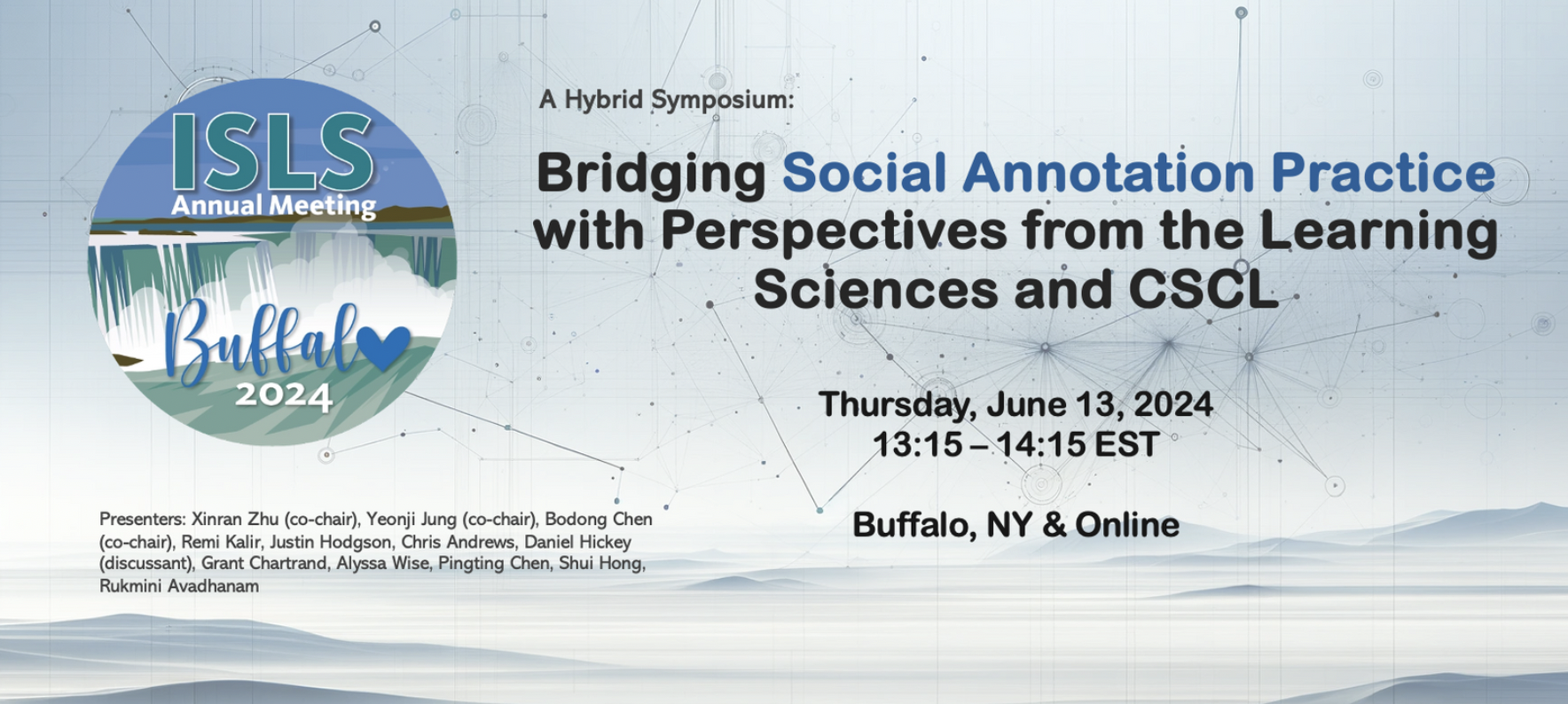From an ecological perspective on learning, my research program recognizes the rich, dynamic, and interconnected system where knowledge emerges from interactions between students, knowledge artifacts, digital technologies, as well as their interdependencies.
My work focuses on designing and investigating the integration of digital technologies within collaborative learning environments, with the goal of supporting productive interactions and knowledge creation in authentic classroom settings.
Ongoing Projects
Augmenting Human Knowledge Creation with Artificial Intelligence
One of my emerging interests is exploring how AI can augment human knowledge creation within collaborative learning environments. This inquiry is grounded in Engelbart's H-LAM/T framework, which conceptualizes the augmentation of Human (H) intellect through Language (L), Artifacts (A), and Methodology (M) in which they are Trained (T) (1962). I’m curious about the following questions: How can we interact with AI in a mindful way? What level of AI literacy is needed for students and teachers? Which knowledge-creation processes are suitable for augmentation by AI? How can we balance agency between humans and AI? What system-wide adjustments are necessary for effective AI integration?
Recent Updates:
- [Paper] This paper delved into students’ use of Generativ AI in high school classrooms, examining their partnership with AI agents in knowledge-building activities: Chen, B., Zhu, X., & del Castillo, F. D. (2023). Integrating generative AI in knowledge building. Computers and Education: Artificial Intelligence, 100184. [︎link]
Social Annotation in Educational Practices
Social annotation refers to the application of web annotation technologies in educational settings to support student interaction around course materials and with each other. It is a genre of information technology that allows a user to annotate information in a shared document and anchor a discussion to the annotated information. When it is used socially in online classrooms, it can support social reading, group sensemaking, knowledge construction, community building, and collaborative learning.
Since 2020, we have been collaborating with instructors from various institutions to support the design and facilitation of social annotation activities, aiming to engage college students in reading and discussing course materials. Following a co-design approach, we design both pedagogical and technological innovations, leveraging web annotation tools such as Hypothes.is and Perusall.
Recent Updates:
- [Conference] We organized a symposium at ISLS24: Bridging Social Annotation Practice with Perspectives from the Learning Sciences and CSCL [︎preprint]. Check out our website at: https://social-annotation-ed.pubpub.org/isls24-symposium.

- [Paper] New paper introducing our design and implementation of a generic scaffodling framework: Zhu, X., Shui, H., & Chen, B. (2023). Beyond reading together: Facilitating knowledge construction through participation roles and social annotation in college classrooms [︎link]. The Internet and Higher Education, 100919.

- [Paper] Literature review: Zhu, X., Chen, B., Avadhanam, R., Shui, H., & Zhang, R. (2020). Reading and connecting: Using social annotation in online classes [︎link]. Information and Learning Sciences, 121(5/6), 261-271.
Knowledge Synthesis in Collaborative Discourse
Our team developed the Synthesis Lab, a web application designed to support students’ knowledge synthesis processes in collaborative learning. This project highlighted a key challenge in computer-supported collaborative learning: within a collaborative learning environment, it is often difficult for students to continuously advance their ideas across stages and contexts. To tackle this challenge, we design classroom activities supported by the Synthesis Lab to help students connect, analyze, and synthesize their ideas towards sustained knowledge creation across various learning activities.
- [Design] The App is now live at: https://h-synthesizer.web.app/. Feel free to test it out and let me know if you have any ideas or find any bug!
- [Conference] Zhu, X., Shui, H., & Chen, B. (2023). The Synthesis Lab: Empowering collaborative learning in higher education through knowledge synthesis. Proceedings of Computer Supported Cooperative Work and Social Computing (CSCW’23 Companion) (pp. 245-248).
Analytical Advancement Towards Actionable Insights for CSCL Research
To better understand learning in CSCL, there is a growing need for more integrated approaches that comprehensively capture the multifaceted nature of collaboration to inform the design and evaluation of the collabraotive learning activities (Chen et al., 2022; Damşa, 2014; Suthers et al., 2011). In this ongoing project, we aim to develop comprehensive analytical frameworks that leverage natural language processing (NLP) techniques and network analysis to capture the multifaceted nature of collaborative discourse.
Project Updates:
- [Conference] Zhu, X., & Chen, B. (2023). Understanding idea creation in collaborative discourse through networks: The Joint Attention–Interaction–Creation (AIC) framework. Proceedings of the 16th International Conference on Computer-Supported Collaborative Learning - CSCL 2023.
- [Conference] Chen, B., Zhu, X., & Shui, H. (2022). Socio-semantic network motifs framework for discourse analysis. In LAK22: 12th International Learning Analytics and Knowledge Conference (pp. 500-506).
Design Partners:
︎ Graduate School of Education, University of Pennsylvinia︎ College of Liberal Arts, University of Minnesota
︎ College of Education and Human Development, University of Minnesota
︎ School of Public Health, Duke University
